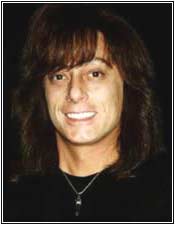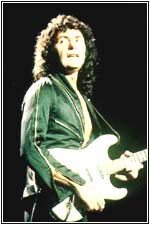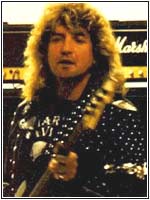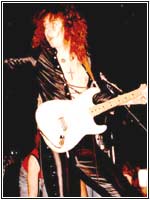By Lisa Eicholzer-Walker
Introduction: In our first feature about
songwriting with VCR's Joe Lynn Turner (Rainbow/Deep Purple), he gave us his thoughts on
the actual writing process. In this interview with Rockforever.com's Lisa Eichholzer-Walker,
he talks about some of the people he has collaborated with. Joe co-wrote almost every
song on all the Rainbow and Deep Purple albums he made when he was with the band (see Joe's Discography). For Rainbow, these albums
were the most commercially successful in the band's history. This was due, in part, to
Turner's contribution both behind the microphone and behind the scenes.

JOE LYNN TURNER |
LISA:
Who was the most inspiring person that you have met or collaborated with?
JLT:
It's actually someone who was not a songwriter in the pure sense. I would have to say as far as inspiration goes, there was a girl from my past who really was this very wordy, very brainy flipped out of her mind woman. We would get into these incredibly deep conversations on the tour bus and challenge each other. It's really hard to describe. She was a genius and scared the crap out of me with what she'd come out with. This was when I was touring with Jason Bonham and Yngwie Malmsteen, that time period.
LISA:
What about professionals ... are there any more well-known names that you can list that really touched a nerve, provoked you to write better than you thought you could?
JLT:
People like Desmond Child, Diane Warren and Holly Knight ... as you know they have written so many hit songs for some major names. Sure, they are inspiring because they are so good at their craft. I also learned a lot from them Jack Ponti. He's a very diverse writer, he's even working with rap artists now. It's also a challenge to come up with something original every time. One thing I learned from Desmond Child is that if you are gonna cop something make sure you do it better the second time, and disguise it, even if you are coping your own work! For example, the Aerosmith song, "Angel" is a cop of "Rage of Angels" by Bonjovi. It's all about taking a piece from a song that is inspiring and building around it. So yeah nothing out there is completely original but it's all in how you present it. As far as artists go, Dylan was always inspiring. Then, of course there's Hendrix, Jimi was my mentor, I even wrote and English lit piece all about "Axis Bold As Love." Hendrix was a visionary.
(author's note: JLT has a degree in Education and taught college-level English Literature)
LISA:
You mentioned those big name songwriters like Desmond Child and Diane Warren ... I remember having lunch with one of your record promo people from Elektra, back when they were working the "Rescue You" album and he surprised me when he said that you were working with Screen Gems, writing with all these people who were legendary.
JLT:
It was the thing to do back then and a lot of people did not realize that I was doing that. I was literally thrown in with these great writers and came up with some great ideas. I had a few run-ins with some of them but that's to be expected. It was one of those situations where here I was working with these major names in songwriting and many of them copped my ideas but since they were the darlings of the industry, I had to shut my mouth when that happened. I was the underling back then. I'm not bitter about it, it's just the way it was. You had to have publishing clout or name clout. It's about politics of the industry. Hey you can't stop a good song [from getting out].

RITCHIE BLACKMORE |
LISA:
OK, let me just name some names of notable people you have collaborated with ... and you can just give me some random thoughts on them. Ritchie Blackmore:
JLT:
Ritchie loved ?The Song.' He was a REAL song man and this may surprise people. He was NOT just a guitar guy. Working with him was very collaborative ... he would allow room and growth. Working with him was productive, too, because it was always important to him to get the best song out possible ... he could care less if he played a long solo. A lyric or message would really move him and you would not think that about him being a guitarist but it's true. He is very fair and would actually leave a lot up to me. As I told you last time, he'd give me bits and pieces of music and I'd end up putting it all together sometimes.
LISA:
You and I have talked about Ritchie a lot and I have never ever heard you take a shot at him. While he rarely does interviews, in the few that I have read he has also had high regard for you. But, both of you get some heat from fans about not exactly being politically correct with some of your opinions, you both have a rep for being outspoken
JLT:
Voltaire, the great French Revolutionist said you need to have contempt for audience and most people don't really know what that word means so if you don't, look it up! As an artist, you have to just do what you do! You can't react to every remark or every bad review and Blackmore was a big believer in this. You can't always dignify their remarks, you cannot stay in the middle of it. I have my motives and I have my opinions and not everyone has to agree with them.
LISA:
Well said. Another related name: Roger Glover
JLT:
Roger could also be very inspiring. He really touched on deep subjects. I really enjoyed working with him, he often would bring out another element or character in my writing.

BOB DAISLEY |
LISA:
What about Bob Daisley? You worked with him on the Mother's Army project.
JLT:
Bob is amazing, you know he wrote all those great Ozzy lyrics for songs like "Crazy Train" and "Over the Mountain" and he is involved in a lawsuit about that right now for back royalties. Bob brings up subjects that are very deep, like Peter Gabriel, Sting, lyrics about changing the world, writing about what's happening.
LISA:
Not everyone wants to listen to a song that is so deep, lyrically, though.
JLT:
This is true but people need to step back and take a look at what's happening around them and if a song can make them do that, so be it. This planet needs help were not getting it. It's all about making a fast buck nowadays more then ever. No one has any accountability anymore. There are also too many choices, especially for young people. George Carlin was on Larry King the other night and he said something real true that kids these days are growing up as little consumers, we're (society) not trying to educate them. They are a spiritually bankrupt generation.
LISA:
What about the music that is popular today ... some of the rap and other more modern stuff ... do you think that is part of what is wrong with the world?
JLT:
Writing should be a reflection of the world you live in so long as it is coming from that place it is valid. Most of the rap stuff is totally valid, some of the stuff is not, though. Take the whole Sisquo Thong Song thing. Basically something like that is not going to change society. But most of the rap is legit. These people are actually oppressed and live in slums. Those are the real poets, people like Tupak Shakur, he was one of the great ones, absolutely. Even someone like Eminem ... he LIVED the life he raps about and what he talks about is very real to him.

ROGER GLOVER |
LISA:
I know we have talked about Roger Glover and Ritchie Blackmore as separate entities but what I'd like to know more about are the dynamics of working with them in the context of Deep Purple versus Rainbow?
JLT:
It was very different in some ways. There were a lot of band politics going on. Roger sided with the Gillan camp (as you know they have been friends for years). So in that sense it was not as collaborative. Now Ritchie was still pretty much the same. The best way to describe it all is tense. Now it was all very professional and there was sense of honor and respect for each other. After "Slaves and Masters," when we started to work on the second album, is when the real trouble started. That's when the mutiny problems surfaced. Jim Peterik came in and worked with us and some of the band members resented that. It's too bad because the material Jim wrote was really great and now it will never see the light of day.
LISA:
Why not?
JLT:
It's a legal issue and it's too complex to explain here but basically there would be no way to even-steven it up or divide the money. Fans deserve to hear it, it's too bad. There's this great tune, "Stroke a Midnight" that has a real "When the Levee Breaks" sound to it, it's great!

YNGWIE MALMSTEEN
Photo by James Schumacher 1984 |
LISA:
What about Yngwie Malmsteen?
JLT:
Yngwie was a gifted genius in many ways but overall he was (at the time) somewhat immature and jealous. I wrote all the lyrics and melodies on "Odyssey." He would come up with song titles. As I have said he was less collaborative but we did have a productive relationship ... out of our partnership came some real fire ... out of the fire comes steel. Yngwie was very guarded, territorial and possessive. But, I agree we did some great work. It was a very proud moment in time but we were like two bulls in a china shop.
LISA:
I know you worked with Mick Jones and Al Greenwood of Foreigner.
JLT:
Yes ... consummate pros. They are incredible writers. Mick always said he never wrote a song unless he had to, until the record was due. That was when he did the best work and they have written some great commercially successful songs.

BILLY JOEL |
LISA:
Speaking of great writers, I do not think you wrote with Billy Joel but I know you worked with him in the studio.
JLT:
Yeah, that was a great time, very inspiring. It was during the "Storm Front" sessions. I remember when Billy was writing "Go to Extremes" that his drummer, Liberty DeVito said he would not play the tracks until he knew what the lyrics were. Remember the last time we talked, I told you how I strongly believe that the music has to fit the lyrics and vice versa. One of the greatest memories I had from those sessions was when a few of us were sitting around after a long day in the studio. We were listening to "And So It Goes" which was actually inspired by an old Scottish folk song. It's just Billy and the piano and it completely knocked us out. Billy started to cry at hi own lyric and that got me crying so here we were, these grown men just crying our eyes out at this poignant lyric.
LISA:
Can you name any other songs that make you cry?
JLT:
Yeah, there is this song by The Blue Nile
LISA:
Which one?
JLT:
I'm not going to tell you, THAT, it's too personal but it comes from a place that I relate to so much that it is revealing. That's all I'm going to say.
LISA:
I know you have recorded some tracks with VCR's Leslie West. Did you two ever collaborate?
JLT:
Yes and no ... .we did dabble in the early days. Leslie is very down to earth, I really like his stuff.
LISA:
Is there anything you'd like to say as we wrap things up?
JLT:
Yes, one major point: most people don't listen to lyrics or have very little knowledge of what the words of a song actually are. Most of us [songwriters] beat ourselves up to get it right so I wish people would listen more attentively. Also ... we've talked about all this deep stuff but remember that not every line can be so strong and profound. I used to think that every line had to be a great one but I've unlocked that prison that I once had myself in. You look at the Henleys, the Dylans and the Billy Joels and EVERY LINE is a killer, it's either so deep or so meaningful but I have realized that as long as I am getting a point across it's a good thing ... I've accomplished something.





